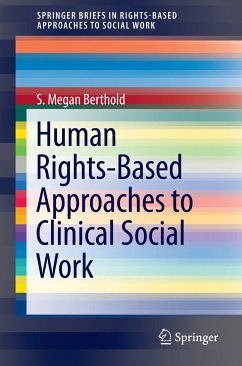This groundbreaking Brief brings a rights-based perspective to social work as opposed to the charity- and needs-based formats traditional to the field. Core principles for effective practice are discussed in the context of global human rights advocacy, from addressing individuals' immediate issues to challenging the structures that allow continued injustices to marginalized populations. Focusing specifically on interventions with survivors (and some perpetrators) of torture, human trafficking, and domestic violence, coverage explores and explodes myths about these issues--some of which survivors themselves may believe--and illustrates the immediate application and long-term benefits of rights-based therapy. Case examples, discussion questions, resource links, and a clinician self-care section reinforce the salience of this approach, modeling practice that is ethical in its outlook and empowering in its healing.
Clinician skills emphasized in Human Rights-Based Approaches to Clinical Social Work:
- Reframing client needs as human rights.
- Cultural humility versus cultural competence.
- Building the therapeutic relationship and reconstructing safety.
- Developing trauma-informed practice and avoiding re-traumatization.
- Forensic and activist roles for social workers.
- Burnout prevention for practitioners.
Dieser Download kann aus rechtlichen Gründen nur mit Rechnungsadresse in A, B, BG, CY, CZ, D, DK, EW, E, FIN, F, GR, HR, H, IRL, I, LT, L, LR, M, NL, PL, P, R, S, SLO, SK ausgeliefert werden.









